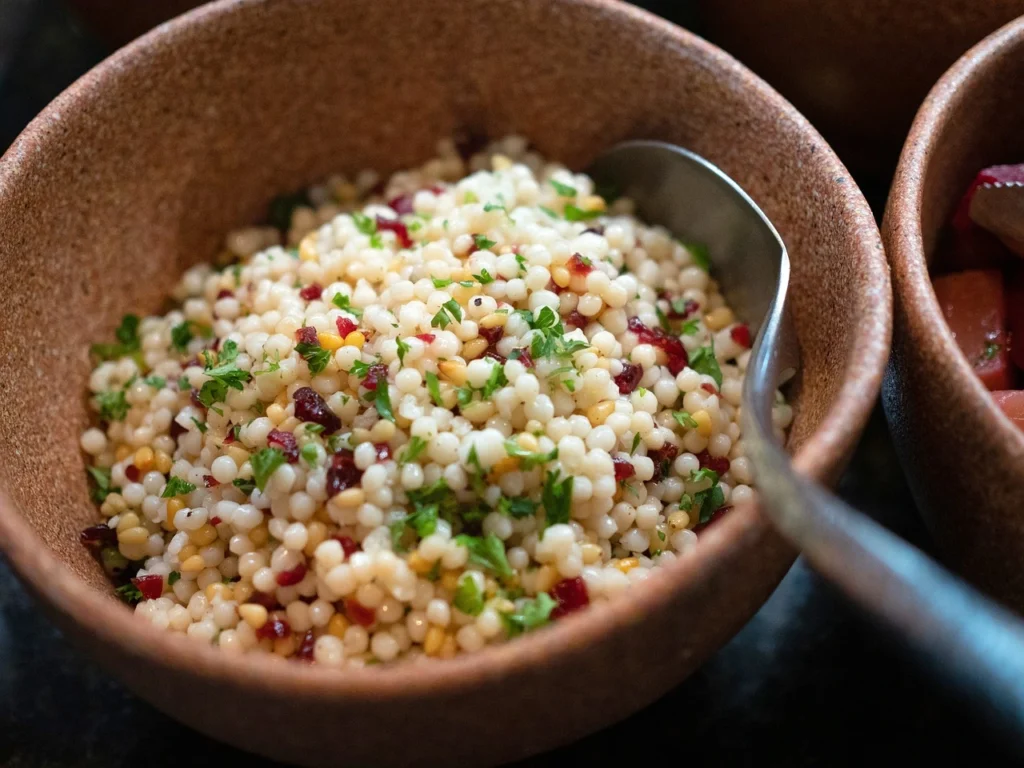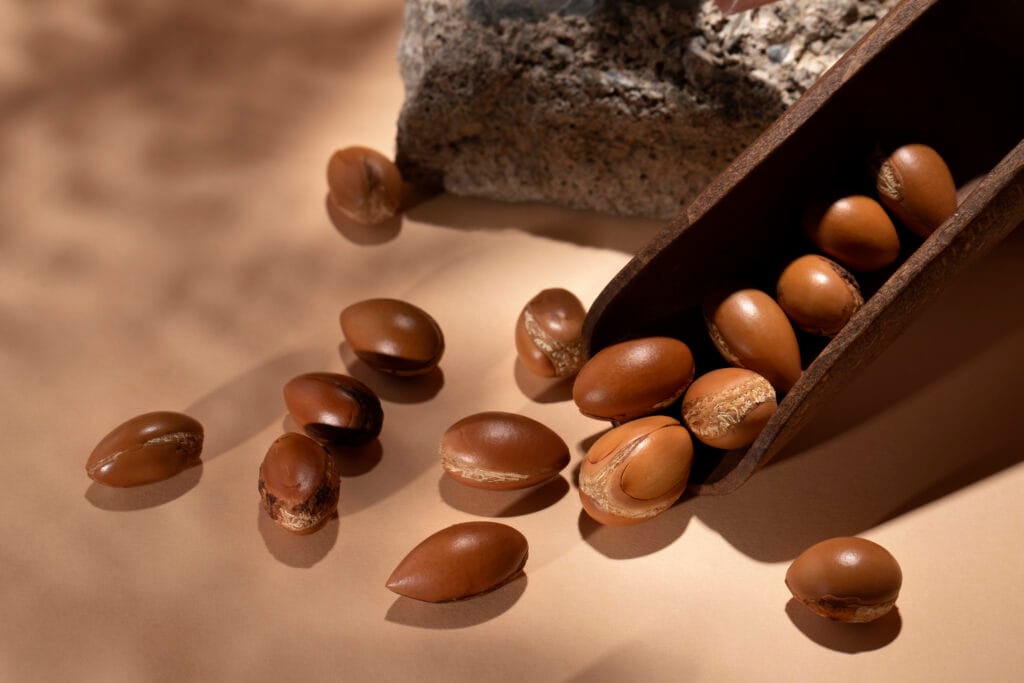Moroccan Argan Oil: No. 1 in the World Treasure with Incredible Health Benefits
From the heart of Morocco comes a culinary gem known worldwide for its unique flavor, rich nutrient profile, and remarkable health benefits: Moroccan argan oil. Often called “liquid gold,” this oil has been a staple in Moroccan kitchens for centuries, bringing not only flavor but also wellness into everyday meals. In this article, we’ll explore what makes Moroccan argan oil exceptional for cooking, how it benefits your health, and practical ways to incorporate it into your culinary routine.
Table of Contents
What Makes Moroccan Argan Oil Special in Cooking?
A Flavor Like No Other
Moroccan argan oil stands out for its distinctly nutty, slightly roasted flavor profile. Produced by cold-pressing the kernels of the argan tree fruit, this oil offers a warm, earthy taste that enhances everything from salads to tagines. It’s a versatile oil, used not only for its taste but also for its high-quality fats and nutrients that are retained through traditional, minimal processing methods.
Cold-Pressed Purity for Maximum Benefits
Unlike many other oils that are heat-processed, Moroccan argan oil is often cold-pressed. This method preserves its natural flavor and nutrients, making it an ideal addition to your cooking. Cold-pressing ensures that the antioxidants, essential fatty acids, and vitamins within the oil remain intact, giving you the maximum health benefits from each drop.
Nutritional Powerhouse
The nutritional profile of Moroccan argan oil is impressive, making it a healthy choice for those looking to enhance their dishes with heart-healthy fats and other essential nutrients.
| Nutrient | Benefits |
|---|---|
| Oleic Acid (Monounsaturated Fat) | Supports heart health, balances cholesterol |
| Vitamin E | Antioxidant, supports skin health |
| Polyphenols | Anti-inflammatory, fights free radicals |
Packed with oleic acid, polyphenols, and vitamin E, this oil goes beyond flavor, offering a range of health benefits that make it ideal for cooking, drizzling, and dressing.
Top Culinary Uses for Moroccan Argan Oil
1. Elevating Salads and Dressings
One of the easiest ways to incorporate Moroccan argan oil into your cooking is by using it in salads and dressings. Its unique flavor adds a depth to greens, grains, and vegetables that’s hard to match. Try it in a simple vinaigrette with lemon juice, salt, and herbs for a refreshing dressing that complements a wide variety of dishes.
Recipe Idea: Moroccan-Style Salad Dressing
- Ingredients: 3 tbsp argan oil, 1 tbsp fresh lemon juice, 1 tsp honey, salt, and pepper to taste.
- Instructions: Combine all ingredients and whisk until emulsified. Drizzle over mixed greens, cucumber, and tomato for a light, flavorful salad.
2. Perfect Pairing for Bread and Dips
In Moroccan cuisine, it’s common to serve argan oil as a dip for fresh bread, often accompanied by amlou, a traditional Moroccan spread made from almonds, honey, and argan oil. This combination is not only delicious but also nutrient-rich, making it a great snack or appetizer.
Easy Amlou Recipe
- Ingredients: 1 cup roasted almonds, 2 tbsp honey, 2 tbsp argan oil.
- Instructions: Blend the almonds into a paste, mix in the honey and argan oil, and serve with warm bread.
3. Finishing Oil for Tagines and Stews
Moroccan argan oil is best used as a finishing oil rather than for cooking at high heat. Its flavor shines when drizzled over a tagine or stew just before serving, adding a nutty richness to the dish without overpowering the spices.
Tip for Use:
Add a spoonful of argan oil over dishes like lamb or vegetable tagine right before serving to bring out its depth of flavor.
4. Adding Depth to Moroccan Couscous and Grains
Couscous, a staple in Moroccan cuisine, pairs wonderfully with the nutty tones of argan oil. Adding a drizzle of argan oil to couscous, quinoa, or rice elevates the dish, providing a comforting and satisfying depth.

Recipe Idea: Nutty Couscous with Dried Fruits and Argan Oil
- Ingredients: 1 cup couscous, 1 tbsp argan oil, ¼ cup chopped dried apricots, ¼ cup toasted almonds.
- Instructions: Prepare couscous as directed, then mix in the apricots, almonds, and a drizzle of argan oil before serving. www.moroccanfoodie.com/chicken-couscous-recipes/
Culinary Uses at a Glance
| Recipe | Usage | Flavor Benefit |
|---|---|---|
| Moroccan Salad Dressing | Drizzle on salads | Adds nutty depth to greens |
| Bread Dip with Amlou | Spread for bread | Complements Moroccan spices |
| Finishing Oil for Tagines | Drizzle before serving | Adds richness to spices and meats |
| Couscous with Dried Fruits | Stir into grains | Balances sweetness and nutty flavor |

Health Benefits of Adding Moroccan Argan Oil to Your Cooking
1. Supports Heart Health
One of the most significant benefits of culinary argan oil is its high concentration of oleic acid, a monounsaturated fat that supports heart health. Oleic acid has been linked to reduced levels of LDL cholesterol, promoting better cardiovascular health.
2. Boosts Digestive Health
Rich in antioxidants and polyphenols, argan oil has anti-inflammatory properties that aid in digestion. These compounds help reduce inflammation in the digestive tract, supporting smoother digestion and nutrient absorption.
3. Provides Powerful Antioxidants
Vitamin E and polyphenols in argan oil act as powerful antioxidants that fight free radicals, reducing oxidative stress in the body. This can lead to improved skin health, a strengthened immune system, and a reduced risk of chronic diseases.
Source: Harvard Health
Tips for Buying Authentic Culinary Argan Oil
When purchasing Moroccan argan oil, choosing a high-quality product is essential for achieving the best results in your cooking.
Ensure Quality with These Guidelines
- Look for Labels that Say “100% Pure Argan Oil”: Ensure that you’re getting pure culinary argan oil, as some products may be diluted or blended with other oils.
- Check for Organic Certification: Organic certification helps ensure that the oil is free from pesticides, preservatives, or other additives, making it safer and healthier for consumption.
- Choose Dark Glass Bottles: Pure argan oil is sensitive to light, which can degrade its nutrients over time. Dark bottles help protect the oil, preserving its flavor and quality.
- Avoid Added Ingredients: Authentic culinary argan oil should have only one ingredient—“100% argan oil”—with no added preservatives, fragrances, or fillers.
Conclusion: Elevate Your Kitchen with Moroccan Argan Oil
Moroccan argan oil is much more than just an ingredient; it’s a culinary experience that brings warmth, flavor, and wellness to your kitchen. Its nutty richness can elevate a variety of dishes, from salads and dips to tagines and grains. Beyond taste, this oil is a powerhouse of nutrients that support heart health, aid digestion, and provide antioxidants that benefit overall health.
Whether you’re looking to enhance the flavor of your favorite dishes or add a nutritional boost, Moroccan argan oil is an exceptional choice. Its versatility and health benefits make it a valuable addition to any kitchen.
Call to Action: “Experience the true essence of Moroccan cuisine—try adding Moroccan argan oil to your cooking, and taste the difference it makes in your culinary creations.”
Frequently Asked Questions (FAQ) About Moroccan Culinary Argan Oil
What makes culinary argan oil different from cosmetic argan oil?
Culinary argan oil is produced specifically for consumption, using a distinct method that preserves its nutritional properties and flavor, unlike cosmetic argan oil, which is often processed differently and may contain additional ingredients.
Can I use argan oil for high-heat cooking?
Culinary argan oil is best for low-heat applications or as a finishing oil. Using it at high heat may reduce its nutrient content and affect its flavor.
How should I store culinary argan oil?
Store argan oil in a cool, dark place, ideally in a dark glass bottle to protect it from light exposure and help it retain its freshness.
What are the key health benefits of culinary argan oil?
Culinary argan oil supports heart health, improves digestion, and provides antioxidants, making it a healthy and versatile addition to your diet.
Can Moroccan argan oil help with skin and hair when used in food?
While primarily beneficial for internal health, consuming argan oil can indirectly improve skin and hair health due to its high vitamin E and antioxidant content, contributing to overall wellness.
This in-depth guide showcases how to use Moroccan argan oil effectively in cooking, detailing its health benefits, tips for purchase, and practical culinary applications. By integrating this exceptional oil into your kitchen, you’re embracing both authentic Moroccan flavor and enhanced wellness.
Have you tried using it in your recipes? Tell us about your experiences!
There are no reviews yet. Be the first one to write one.

